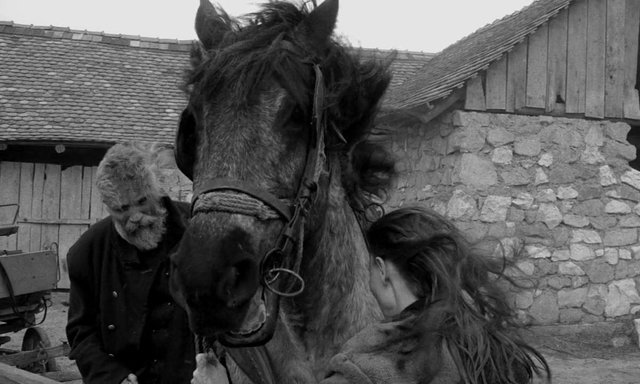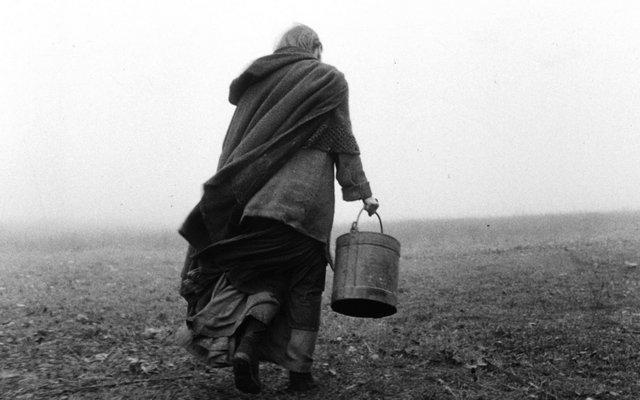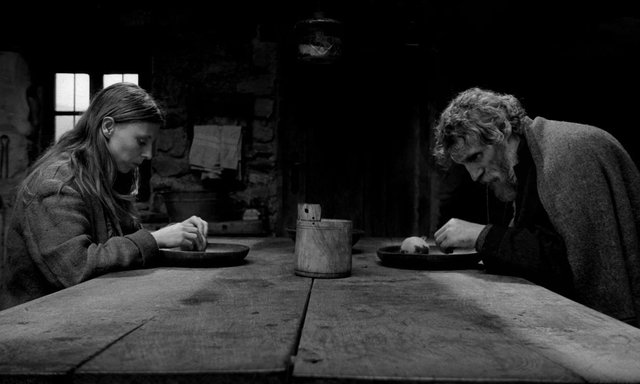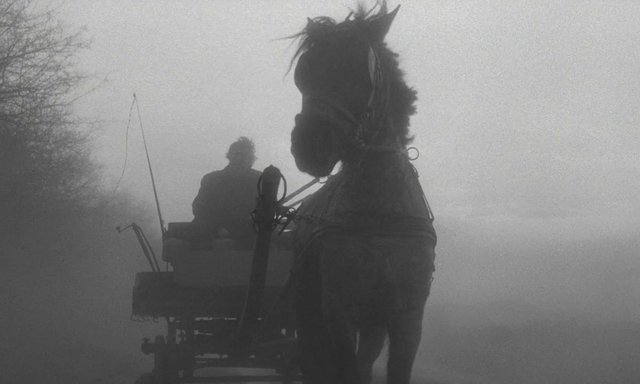/ Film Class #47 / The Turin Horse / Bela Tarr /

The film story Turin Horse begins on the First day. It ends on the Sixth. God created the world in six days, man as the crown on the Seventh. Here, as in the reverse cosmogony, a man is the witness and chief responsible for the destruction of life in six days.
Each individual calls for strict accountability, but why is the dedication to Nietzsche? He overcame the horrors of man's life with a radically negative critique of contempt and hatred. As one of the "more aware", he eventually got his head due to a negative response. Those who give up the world and people would become preachers with a bottle of "palinka" (Bernhard, or author) or crazy in the austerity of destroying criticism (Nietzsche), as if there was no exit and at least a suspicion of the transformation and return of humanity. That is why Bela Tarr, in black-and-white technique, made the metaphorical perspective of the shell of destiny subjective interpretation as a biblical prophecy.

Although death is near, the absurdity of human power is best shown where attempts are made to ignore the final disappearance. Storm that is constantly lingering pressure on ordinary lives in a simple house somewhere in the valley; they do it in their own way, the only way, by completely neglecting the fate that scare them more terribly and more decisively in the face.
Although occasionally the questions of protagonists arise in the form of very scarce dialogues, they barely hesitate in order to end their saving routine, because if they stop everything will disappear. And that can't be possible. The author here probably finds a motive for the criticism of human recklessness - like horses with amps who, despite screaming, can not stop wondering where the evil comes from and who is guilty of all the bad things that have happened to them
And while darkness converges around them, and the wind blows more and more and "always on the same side, from the same direction", there is nobody outside to defy the storm, to oppose this dishonest (air) current. Complete spiritual capitulation!
Nature, people, cities, machines, everything is "theirs," tells Berhnard, the protagonist's neighbor who comes to buy brandy and comfort himself in alcohol. He didn't go to the city, because the cities will be destroyed - everything will be destroyed! He claims that this is not a natural event, but primarily the work of people. Those brilliant, noble ones need to retreat. From the very beginning, they understood everything and even accepted it, but they didn't understand it, and that was a problem ...

The world is disappearing and the days are counting. The father and daughter can't see and feel (the symbol of the wind that constantly torches, screams, expands, threatens, pushes dust into the mouth, puts them in the wilderness, blurs, fades, suffocates).
Nevertheless, their daily rhythm continues and their strength is insistent and crazy rolling the stone of the Sisyphus. And when the termites and the horse cease to execute their "holy will" (Kant), a man (main characters) and the most craziest, most humorous and most ridiculous in him contradicts. He is opposing to surrender, but on the other hand he does not allow any re-examination, because he may know that he has already been beaten, that there is no going back. Indifference as the only resistance force culminates in everyday routines. This mantra helps as a prayer.
It's the only thing they can know and what they are capable of, but why is that so?
The reality of the characters in this black-and-white movie ballad is descended, without the Spirit, and the nature demonized like in Lars Von Trier's Antichrist. And what's left? Gypsies come with the sound of joy (Dionysus), with white horses celebrating freedom and singing, and in contrast, the whole world has been deceived in its dead silence. Why is that so? Is there any hope?

They have no place to escape. They dared, but that didn't work. And when the full darkness is over and every gnaw is gone, then the last time they will try to untangle the natural impulse, neglecting the terrible revelation that the end has already happened.
The musical theme, especially remarkable, predicts a painful end. A unique way of showing our everyday life, according to Bela Tarr, and to show the death we call life.
So Bela Tar, in a very disturbing way, gave an outrageous display of amoral meaningless human beings, null and void creatures who had long since missed and brought the world to the final end, although he abandoned in interviews that the Turin Horse has any pretense or anything like it. However, the thing from which he fled, happened to his films, they became representatives of mankind.
Let the ideological side of the film work remain open to interpretation. Let this question shake each viewer individually. It remains an undeniable judgment that this is an extraordinary film testament of an apocalyptic atmosphere that, along with excellent acting, executed a director's inspiration, rebellious, as well as fitting with his entire artistic legacy.
Note: This was my translation from Serbian to English from PULSE article „Torinski konj” – Bela Tar, by R.Cvetkovic
Great post thank u for sharing love it
May I ask how you became a film director? :)
@modernpastor
I was a cinephile trough my childhood, thanks to my father, then came the video (VHS) clubs... so I decided I want to become a film director in second year of high school I think.
Wooow great.
So you studied Film direction ?
Vrey nice post.l like you no
Hi @marinauzelac , this post was resteemed by @currentnews over 2000 followers. You can check it. At least Upvote this comment and let me grow. thanks
As Satantango, great movie, which became obsessional...thanks for the share.
nice bro, i hoop you upvote and following me. thanks for following me.